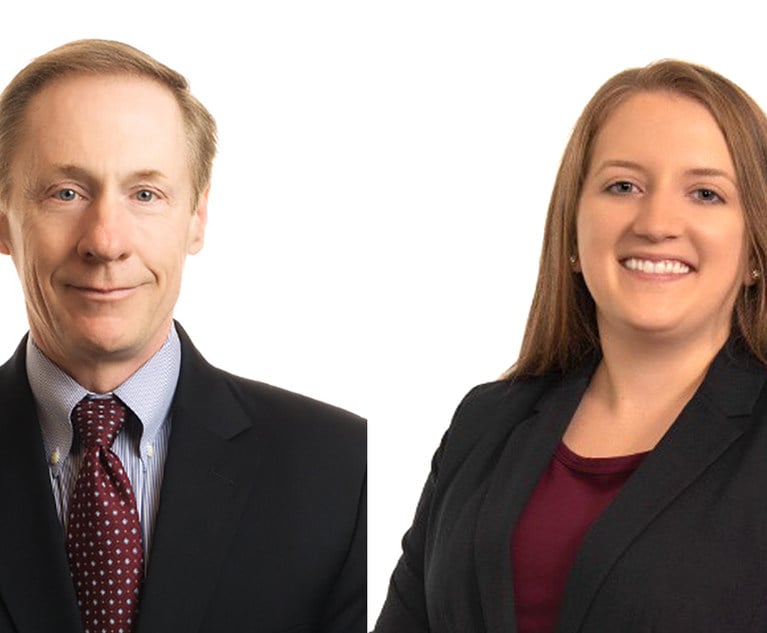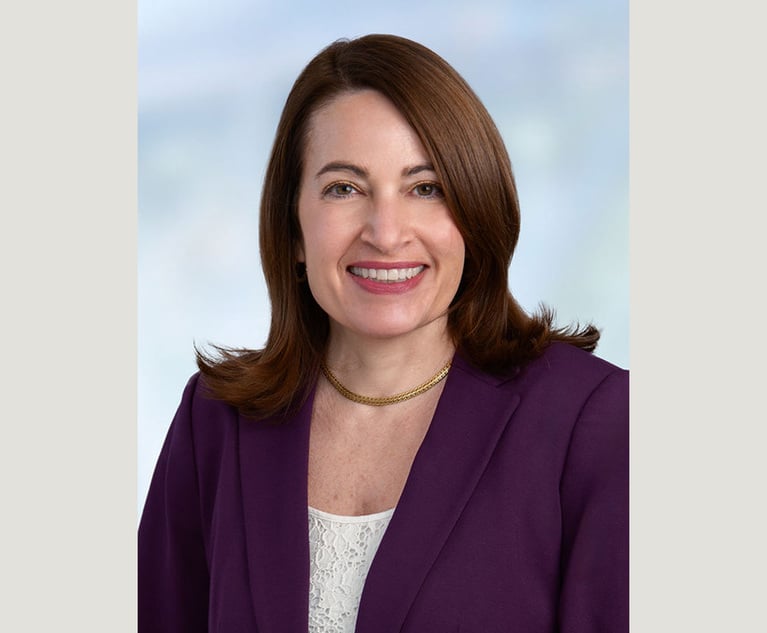 Francis J. Lawall and Marcy J. McLaughlin Smith of Troutman Pepper Hamilton Sanders. (Photo: Courtesy Photo)
Francis J. Lawall and Marcy J. McLaughlin Smith of Troutman Pepper Hamilton Sanders. (Photo: Courtesy Photo) Second Circuit Orders Refund of Unconstitutional Quarterly Fee Overpayment
Many practitioners have been speculating as to how courts will address the potential remedy for the unconstitutional U.S. trustee fees imposed against Chapter 11 debtors pending in U.S. trustee districts under the 2017 amendment to 28 U.S.C. Section 1930 (the 2017 amendment).
December 15, 2022 at 12:15 PM
7 minute read
Many practitioners have been speculating as to how courts will address the potential remedy for the unconstitutional U.S. trustee fees imposed against Chapter 11 debtors pending in U.S. trustee districts under the 2017 amendment to 28 U.S.C. Section 1930 (the 2017 amendment). In June 2022, the U.S. Supreme Court in Siegel v. Fitzgerald, 142 S. Ct. 1770 (2022), held that the 2017 amendment was unconstitutional because it violated the uniformity requirement of the bankruptcy clause of the U.S. Constitution due to the discriminatory higher fees being imposed against Chapter 11 debtors with cases pending in districts administered by the Office of the United States Trustee as opposed to those debtors with cases filed in judicial districts administered by bankruptcy administrators. The Supreme Court in Siegel, however failed to identify a remedy, rather remanding such determination to the lower courts.
In June 2021, The Legal Intelligencer published an article reporting in detail the U.S. Court of Appeals for the Second Circuit's original opinion in Clinton Nurseries, 998 F.3d 56 (2d Cir. 2021) (Clinton Nurseries I), which held that the 2017 amendment was a nonuniform bankruptcy law and, therefore, unconstitutional. The Supreme Court vacated and remanded Clinton Nurseries I for further consideration by the Second Circuit in light of Siegel. On Nov. 10, the Second Circuit issued its amended opinion, 53 F.4th 15 (2d Cir. 2022).
This content has been archived. It is available through our partners, LexisNexis® and Bloomberg Law.
To view this content, please continue to their sites.
Not a Lexis Subscriber?
Subscribe Now
Not a Bloomberg Law Subscriber?
Subscribe Now
NOT FOR REPRINT
© 2025 ALM Global, LLC, All Rights Reserved. Request academic re-use from www.copyright.com. All other uses, submit a request to [email protected]. For more information visit Asset & Logo Licensing.
You Might Like
View All

'In Re King': One Is Definitely the Loneliest Number When Filing an Involuntary Petition
7 minute read
Delaying Rent Payment by Assisted Living and Skilled Nursing Facilities in Chapter 11
7 minute readLaw Firms Mentioned
Trending Stories
- 1Gen AI and Associate Legal Writing: Davis Wright Tremaine's New Training Model
- 2Departing Attorneys Sue Their Former Law Firm
- 3Pa. High Court: Concrete Proof Not Needed to Weigh Grounds for Preliminary Injunction Order
- 4'Something Else Is Coming': DOGE Established, but With Limited Scope
- 5Polsinelli Picks Up Corporate Health Care Partner From Greenberg Traurig in LA
Who Got The Work
J. Brugh Lower of Gibbons has entered an appearance for industrial equipment supplier Devco Corporation in a pending trademark infringement lawsuit. The suit, accusing the defendant of selling knock-off Graco products, was filed Dec. 18 in New Jersey District Court by Rivkin Radler on behalf of Graco Inc. and Graco Minnesota. The case, assigned to U.S. District Judge Zahid N. Quraishi, is 3:24-cv-11294, Graco Inc. et al v. Devco Corporation.
Who Got The Work
Rebecca Maller-Stein and Kent A. Yalowitz of Arnold & Porter Kaye Scholer have entered their appearances for Hanaco Venture Capital and its executives, Lior Prosor and David Frankel, in a pending securities lawsuit. The action, filed on Dec. 24 in New York Southern District Court by Zell, Aron & Co. on behalf of Goldeneye Advisors, accuses the defendants of negligently and fraudulently managing the plaintiff's $1 million investment. The case, assigned to U.S. District Judge Vernon S. Broderick, is 1:24-cv-09918, Goldeneye Advisors, LLC v. Hanaco Venture Capital, Ltd. et al.
Who Got The Work
Attorneys from A&O Shearman has stepped in as defense counsel for Toronto-Dominion Bank and other defendants in a pending securities class action. The suit, filed Dec. 11 in New York Southern District Court by Bleichmar Fonti & Auld, accuses the defendants of concealing the bank's 'pervasive' deficiencies in regards to its compliance with the Bank Secrecy Act and the quality of its anti-money laundering controls. The case, assigned to U.S. District Judge Arun Subramanian, is 1:24-cv-09445, Gonzalez v. The Toronto-Dominion Bank et al.
Who Got The Work
Crown Castle International, a Pennsylvania company providing shared communications infrastructure, has turned to Luke D. Wolf of Gordon Rees Scully Mansukhani to fend off a pending breach-of-contract lawsuit. The court action, filed Nov. 25 in Michigan Eastern District Court by Hooper Hathaway PC on behalf of The Town Residences LLC, accuses Crown Castle of failing to transfer approximately $30,000 in utility payments from T-Mobile in breach of a roof-top lease and assignment agreement. The case, assigned to U.S. District Judge Susan K. Declercq, is 2:24-cv-13131, The Town Residences LLC v. T-Mobile US, Inc. et al.
Who Got The Work
Wilfred P. Coronato and Daniel M. Schwartz of McCarter & English have stepped in as defense counsel to Electrolux Home Products Inc. in a pending product liability lawsuit. The court action, filed Nov. 26 in New York Eastern District Court by Poulos Lopiccolo PC and Nagel Rice LLP on behalf of David Stern, alleges that the defendant's refrigerators’ drawers and shelving repeatedly break and fall apart within months after purchase. The case, assigned to U.S. District Judge Joan M. Azrack, is 2:24-cv-08204, Stern v. Electrolux Home Products, Inc.
Featured Firms
Law Offices of Gary Martin Hays & Associates, P.C.
(470) 294-1674
Law Offices of Mark E. Salomone
(857) 444-6468
Smith & Hassler
(713) 739-1250






